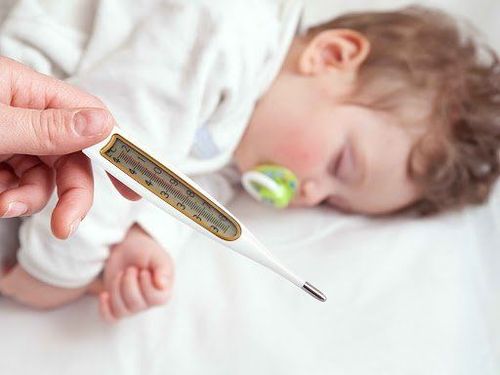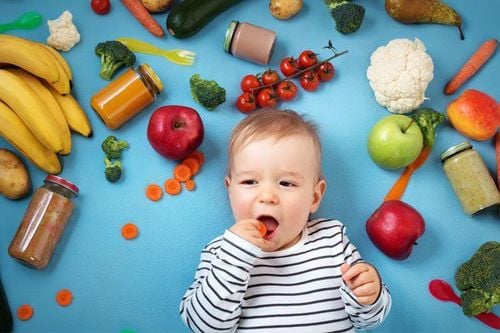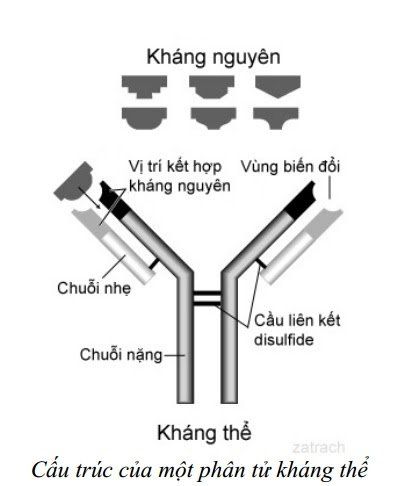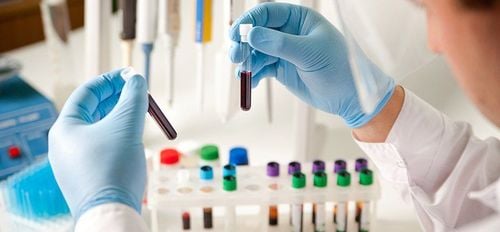This is an automatically translated article.
Many parents complain that their baby starts to get sick often from the time of solid foods until the baby is 3 years old. The cause of this phenomenon is that children are going through an "immune gap" period. So what is the child's immune gap?
1. Baby's immune system in the first 6 months of life
Immune system for children is extremely important. The immune system protects the child's body by recognizing foreign antigens (bacteria, viruses, parasites, foreign cells...) entering the body, thereby producing antibodies to destroy they.
At birth, the baby's innate immunity is still very weak, the amount of antibodies that help the baby fight against the risks of diseases is the IgG antibody that the baby receives from the mother and then the IgG source of colostrum. More specifically, during the third trimester of pregnancy, antibodies from the mother are passed on to the baby through the placenta, a process known as "passive immunity". The antibodies obtained from passive immunity will help the baby to be protected very effectively right after birth.
However, passive immunity does not last forever, passive immunity does not create lasting resistance on its own because since the baby is born, these antibodies will begin to decrease sharply and gradually fade in about the next 6 months. Therefore, right from birth, babies need to be breastfed immediately and exclusively breastfed for at least the first 6 months. At this time, breast milk acts as a continued source of passive antibodies, helping the baby's body maintain its ability to fight off diseases because the baby's immune system is still incomplete and cannot produce itself. antibodies, in other words, children do not have active immunity.
Watch now: "Reboot" the immune system in the cold season

Từ 6 tháng đến 3 tuổi là giai đoạn “khoảng trống miễn dịch” của bé
2. What is the child's immunity gap?
When the baby is 6 months old and on, the IgG antibodies acquired from the passive immunity that the mother transmits to the baby in the last 3 months has decreased a lot, but the child does not have active immunity, it is needed until the child is 3 years old. At age, the child's immune system begins to be able to produce antibodies to protect the child's body from infections.
The period of interference from the age of 6 months to the age of 3 or the "gap" period between the passive and active immune systems is the "immune gap". Therefore, at this age, children become very sensitive to infectious pathogens from the outside environment, leading to frequent diarrhea, respiratory infections, allergies...
Food From 6 months to 3 years of age, during the "immune gap" period, babies also begin to be exposed to the surrounding environment more according to the normal development of physical and brain, this is the basis of the immune system. opportunity for pathogens to attack the child's body. However, at this time, it is very difficult for the baby's body to cope with these factors, which is also one of the reasons that contribute to the frequent illness of the baby during the period of starting solid foods.
Children lacking IgG antibodies during the immune gap period, if not well cared for, are susceptible to infections, leading to frequent use of antibiotics, which in turn causes an imbalance in the intestinal microflora. , leading to the risk of many diseases, having side effects and easily causing antibiotic resistance in the future.
Babies need to be exclusively breastfed for the first 6 months after birth to help them have stable health, creating a premise for the baby to enter the gentle "immune gap" phase. In addition, when it comes to weaning, parents need to add enough nutrition, give the baby enough sleep, increase physical activity, maintain hygiene and should not arbitrarily give the child antibiotics.
Watch now: How to improve the immune system?

Bổ sung vitamin và khoáng chất giúp con “bù đắp” khoảng trống miễn dịch
3. Supplementing with vitamins and minerals helps children "fill up" the immune gap
For many reasons, babies are often weaned by their mothers at the age of 1 year or even earlier, at which point they no longer receive the abundant and wonderful source of antibodies from breast milk. Children need a very long time until 3-4 years old, the child's body can produce antibodies on its own. Therefore, it is very important to supplement vitamins and minerals to support the immune system for children during this period, helping the system to strengthen and quickly fill the immune gap.
Proper nutrition is a way to build a child's own immune barrier, the child's weaning diet is reasonable when it balances the groups of substances: protein, carbohydrates, fats, vitamins and minerals.
Accordingly, strengthening vitamin and mineral supplements is extremely important for babies, there are 90 types of micronutrients to help support the development of children such as vitamins: A (400mcg/day), D (minimum 600 IU) /day, an average of 1,000 IU/day), C (ages 1-6 need 30mg/day), B vitamins... and minerals such as zinc, iron, selenium, calcium, magnesium...
Iron plays an important role in protein formation, immunity and affects physical development and intelligence, the World Health Organization (WHO) recommends providing 7mg/day for children 1-3 years old. , can be through: meat (red meat), animal liver (do not abuse to avoid excess vitamin A), dried fruits, cereals, green vegetables... Zinc is a mineral that plays an important role Important in transporting calcium to the brain, zinc deficiency will hinder the transportation process, making children very irritable. Besides, zinc also helps synthesize growth hormone, insulin hormone, thymulin hormone... along with the effects of vitamins A, E, B6..; which strengthens the immune system to help fight infections. Iodine is also an indispensable nutrient, if a child is deficient in iodine, it will greatly affect the body's activities and development such as causing growth retardation, slurred speech, goiter, hypothyroidism, and children aged 1 - 2 years. 3 year olds need 70mcg of iodine per day. B vitamins (1, 2, 3, 5, 6, 7, 8, 9, 12...) play different roles, but they are all involved in energy production and help children fight negative moods. pole. The need for vitamin B1 must be 0.40mg/1,000kcal, B2 needs to be 0.5mg... Vitamin and mineral supplements are best from food, but not all babies absorb well and enough the recommended amount, then parents can give their children additional products containing vitamins A, C, D, zinc, iron, selenium...
Also according to leading nutrition experts It is recommended that parents be calm and persistent when supplementing with nutrients, even through food or functional foods. In particular, the use of functional foods should choose those of natural origin that are easily absorbed, do not allow simultaneous use of many types or continuously change the types of functional foods. Besides, nutritionists also emphasize on the role of biological zinc; Parents should learn and supplement zinc for children properly at the appropriate time, to avoid zinc deficiency affecting the comprehensive development of children.
For more nutritional knowledge and child care for each age, parents should regularly visit the website vimec.com and make an appointment with the leading doctors, pediatric and nutrition experts of the National General Hospital. Vinmec when needing advice on children's health.













